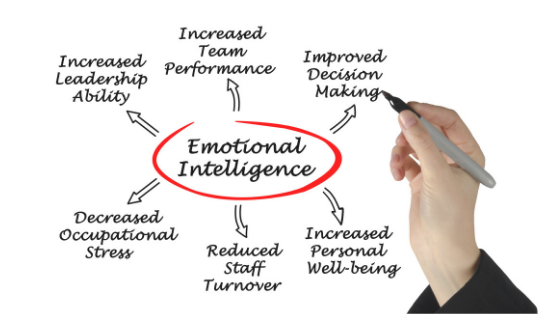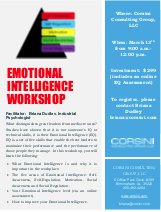
This week’s blog is from Briana Dudley, an Industrial & Organizational Practitioner + Executive Coach at our firm, who uses her expertise in behavioral sciences to help our clients improve company communications, further employee development, and help new hires succeed during the critical on-boarding process.
Briana will be leading a three-hour EQ Workshop on March 13th from 9 a.m. to noon. There’s a link at the end of this blog.
Here’s why it’s important:
Emotional intelligence (EQ) is one of the main components of successful leadership. In fact, research has shown that the most effective leaders all have a high degree of emotional intelligence. A person can have a high IQ, the best education and training in the world, but those things will not necessarily make them a great leader. According to multiple studies, EQ is twice as important as cognitive or technical skills.
So what is emotional intelligence? It’s the ability to sense and understand one’s emotions and effectively apply the power of emotions to facilitate high levels of collaboration and productivity. Putting it simply: EQ is understanding what you are feeling and what others are feeling and then managing those emotions (both good and bad) and channeling them into something positive.
Let’s Break It Down
There are five components of emotional intelligence: self-awareness, self-regulation, motivation, social awareness and social regulation. Self-awareness is having a keen understanding of one’s emotions, strengths, weaknesses, needs and drives. People with high self-awareness understand their limitations, and they are confident and hopeful. Self-regulation is the ability to control or redirect disruptive impulses or moods. This creates an environment of trust and fairness.
Motivation is the next step of emotional intelligence. It is the ability to channel or redirect emotions in a positive and productive way. Without it, people will not have the drive to continually improve. Social awareness is the understanding of other people’s emotional cues. It is the ability to put yourself in someone else’s shoes. Social regulation is all the previous steps combined. It is the ability to manage relationships effectively and to use one’s emotions in a productive way.
In short, an emotionally intelligent leader can monitor his or her moods through self-awareness, change them for the better through self-regulation, put them to good use through motivation, understand their impact through social awareness and act in a way that boosts others’ moods through social regulation.
Here’s the bonus part of all this: An emotionally intelligent leader creates emotionally intelligent teams. Research has proven an exceptionally strong link between emotionally intelligent leaders and the success of a company.
The high EQ of a leader not only affects their job directly, but it also affects the whole team with a trickle-down effect. The leader’s mood and behaviors drive the moods and behaviors of the entire team. This is called mood contagion. Our brains are hardwired to be influenced by the moods of those around us, so it makes sense that a leader’s mood and their behaviors can affect—for better or for worse—the bottom-line performance of their team.
The Manager-Employee Relationship
A Gallup poll revealed that managers account for 70% of the variance in employee engagement scores, and only 30% of U.S. employees are actively engaged at work. These statistics illustrate how crucial leaders are to the success of a company. But it takes the right leaders. Those with high EQ have the necessary skills to lead their teams to success—to inspire them and direct their energy in positive ways.
So, if a company wants to have actively engaged employees and low employee turnover, they need to hire emotionally intelligent leaders. If you would like to find out more about emotional intelligence, please join our three-hour EQ Workshop on March 13th from 9 a.m. to noon. Click the thumbnail below for more details and learn how to register.
